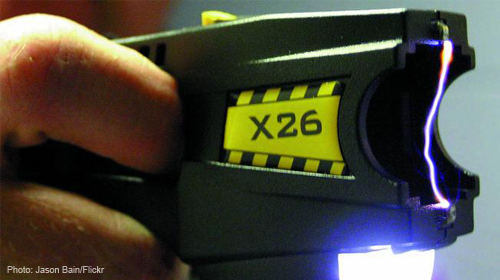
Justified.
That’s how the Pierre Police Department described an incident several days ago where an officer fired his Taser at an 8-year-old girl after receiving a report that she had stabbed herself in the leg and appeared suicidal.
When police they arrived on the scene, the girl was holding a paring knife to her chest.
So how did the police respond to this small child who appeared to be having an emotional crisis? One of the officers tased her in the chest and stomach. Afterwards, the girl was transported by ambulance to the hospital, where the doctors found that she in fact had no stab wounds on her legs. “She was in pain the whole night,” the girl’s mother told reporters about her daughter’s response to being shot with a Taser.
The haunting question is why law enforcement officers used such aggressive force. It’s difficult to think of a situation in which it would be appropriate to use a Taser on a child—but it seems quite clear that this is not one of them.
Tasers subject their victims to a 50,000-volt shock followed by 100 microsecond pulses of 1,200 volts. Since 2001, more than 500 people in the United States have died after law enforcement officers used this weapon against them. Tasers can be especially dangerous when used against young people.
In addition to the physical risks, kids are especially vulnerable to pain and fear—so you can imagine the kind of trauma an 8-year-old girl who possibly wanted to harm herself might have experienced during this incident.
Tasers are dangerous, and it’s important that cops take this seriously. Without clear training and limitations, officers may use Tasers not because it is appropriate and necessary in a specific situation, but because it is an easy weapon to use and within reach. Tasers should not be the go-to weapon of choice in any and every situation. The risk is simply too great that using a Taser to respond could result in additional trauma, physical injury or even death. A study last year specifically found that sending shocks to the chest—which the police did to this 8-year-old girl—can cause cardiac arrest and sudden death. Simply put, police never should have tased this 8-year-old girl in the chest. Yesterday’s ordeal could have ended much worse for the 8-year-old girl, her family, and the police.
When police decide how much force to use, they are subject to the 4th Amendment’s reasonableness standard, according to Graham v. Conner. In that case, the Supreme Court laid out the following test: to determine whether the force used was reasonable, courts must weigh the intrusion on the individual’s interests against the government’s interest. The government’s interest is measured by looking at the severity of the crime (in this instance, there was no crime), whether the person posed an immediate threat to the officers or others (here, a child suffering a mental health issue who may have posed a danger to herself), and whether the person was resisting arrest by fleeing (the girl was standing still and was facing police when she was tased). While we wait for an investigation into the incident, it is hard to understand how a reasonable officer would think that tasing an allegedly troubled child is the best way to protect that child from harming herself.
Aggressive police tactics are used every day, in every state – often to shocking and dangerous extremes, as was the case here. This disturbing incident should serve as a reminder that police departments need clear training on how to respond to mental health crises and clear limitations on use of potentially lethal force, especially against children.
Learn more about police practices and other civil liberties issues: Sign up for breaking news alerts, follow us on Twitter, and like us on Facebook.

